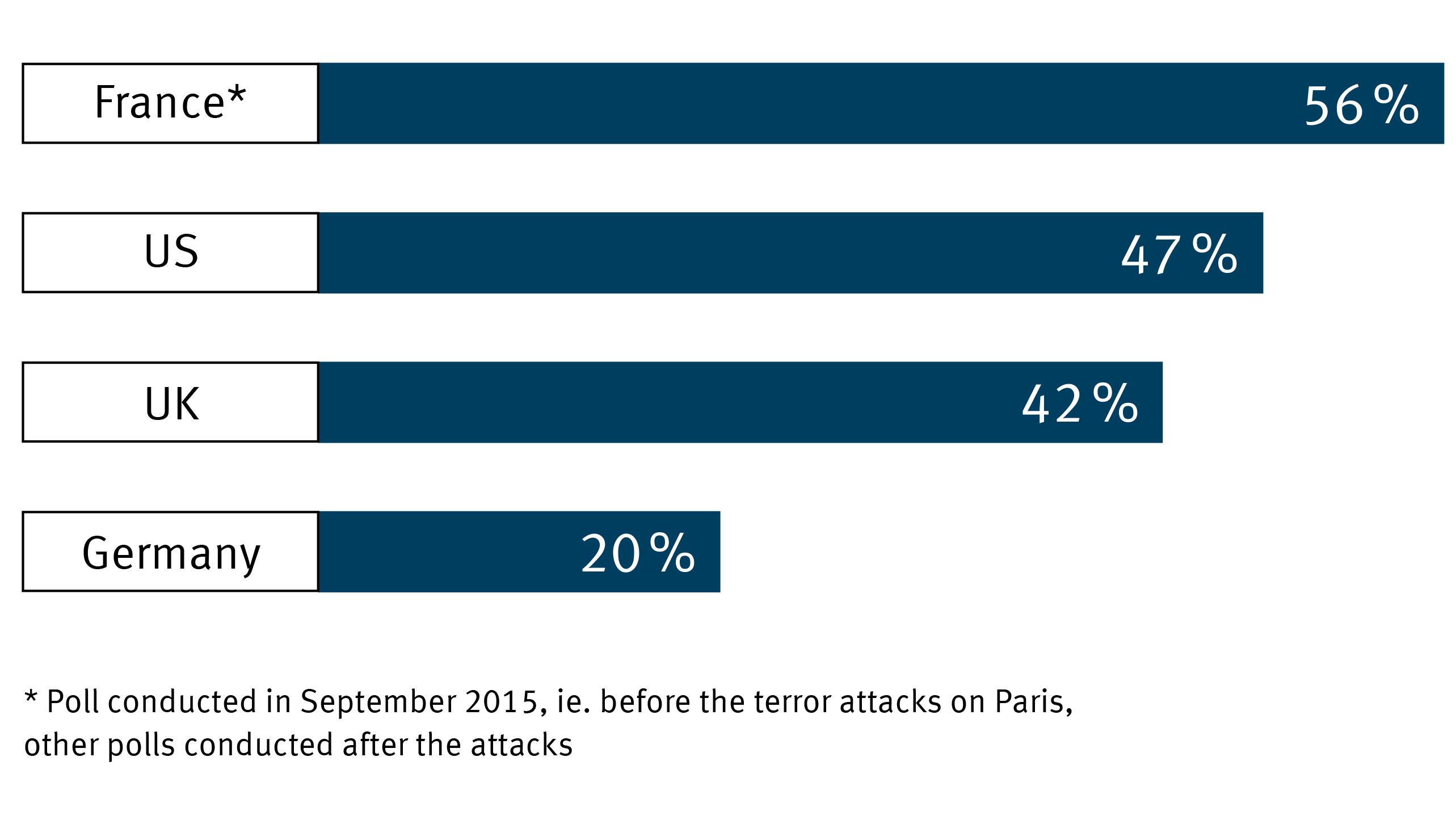Approval Ratings for the Deployment of Ground Troops to Fight IS
Polling in Europe has reflected an awareness of this new normal. In Britain, 74 percent said that they expected a major terrorist attack to be committed in the UK in 2016, compared to 49 percent two years ago. In Germany, two thirds said in December that they were afraid that a terrorist attack would be carried out at some point in the immediate future, a number that has risen steadily since the terrorist attack in Paris in January 2015. Fifty-seven percent said that Germany is threatened by the “political situation” in the world. And in France itself, 98 percent responded on November 16 that the threat of terrorism was high, while 59 percent said that France was in a state of war. (This last figure dropped to 37 percent in mid-December – but 94 percent still said that the threat of terrorism was high.)
There is less consensus, however, about what to do to combat IS. Germans want to support French military operations against IS, but only up to a point: over half said that Germany should provide France military support, but when asked what that support should entail, only a third wanted Germany to play an active role in air strikes, while only a fifth approved of the use of German ground troops. The only option that won clear approval (59 percent) was German participation in reconnaissance and refueling missions. Seventy-four percent of Germans said more must be done to close security gaps, but 63 percent said that military operations would likely increase the threat of terrorism.
In the UK, popular opinion is steadily shifting against military operations in Syria entirely. While 59 percent approved of the RAF participating in air strikes targeting IS the week after the attack, that support has dwindled dramatically: only 44 percent said on December 3 that they would support the RAF participating in air strikes, while the number who opposed grew from a fifth to 36 percent. Britons were almost evenly split (42 percent to 37 percent) when asked if the UK and the United States should send ground troops into Syria. Part of the shift represents a domestic political battle: following a staunch anti-air strike campaign from Labor leader Jeremy Corbyn and a bruising fight in the House of Commons on December 1, Labor voters were the most likely to change their positions, going from 52 percent in favor of British participation in air strikes on November 24 to 51 percent opposed on December 3.
Meanwhile, in France, public opinion supports taking a number of dramatic steps to fight terrorism – both abroad and at home. Eighty-five percent said in November that they supported military operations against IS, and even in September, two months before the Paris attacks, 56 percent were willing to send French ground troops as part of a coalition force in Syria. Eighty-four percent were prepared to accept limitations on their personal freedom to improve security, 74 percent were in favor of immediate apprehension of people evaluated by the security services as dangerous (or under special observation), and, at the end of December, 85 percent said they would support rescinding the French citizenship of double citizens born in France convicted on charges of terrorism.
And what of the Americans, who will have to play a significant role if military operations in Syria are to escalate? Eighty-three percent said in early December that IS represented a “major threat” – compared to half who said the same of climate change and the rise of China and slightly over 60 percent who said the same of Iran’s nuclear program. Sixty-four percent approved of US military operations against IS, and 50 percent were more worried about the US doing too little in Syria, compared to only 42 percent who were concerned that the Americans would become too involved. At the same time, the nation was evenly split on the deployment of ground troops, with 47 percent favoring the option and 47 percent opposing.
While air strikes might be able to roll back the advance of IS, it is ground presence that will shape the post-war order in Syria. With the major transatlantic powers reluctant to send ground troops, that task will likely fall to regional powers already active in the country – including Iran, Hezbollah, the Kurds, and whatever Syrian opposition forces are left, friend or foe.
Read more in the Berlin Policy Journal App – January/February 2016 issue.








